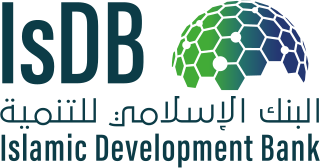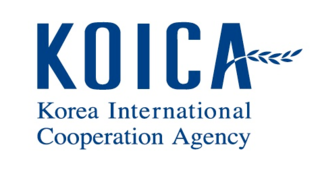
The Asian Development Bank (ADB) is a regional development bank established on 19 December 1966, which is headquartered in 6 ADB Avenue, Mandaluyong, Metro Manila 1550, Philippines. The bank also maintains 31 field offices around the world to promote social and economic development in Asia. The bank admits the members of the UN Economic and Social Commission for Asia and the Pacific, and non-regional developed countries. Starting with 31 members at its establishment, ADB now has 69 members.
The International Bank for Reconstruction and Development (IBRD) is an international financial institution, established in 1944 and headquartered in Washington, D.C., United States; it is the lending arm of World Bank Group. The IBRD offers loans to middle-income developing countries. It is the first of five member institutions that compose the World Bank Group. The initial mission of the IBRD in 1944, was to finance the reconstruction of European nations devastated by World War II. The IBRD and its concessional lending arm, the International Development Association (IDA), are collectively known as the World Bank as they share the same leadership and staff.

The European Investment Bank (EIB) is the European Union's investment bank and is owned by the 27 member states. It is the largest multilateral financial institution in the world. The EIB finances and invests both through equity and debt solutions companies and projects that achieve the policy aims of the European Union through loans, equity and guarantees.

The Global Environment Facility (GEF) is a multilateral environmental fund that provides grants and blended finance for projects related to biodiversity, climate change, international waters, land degradation, persistent organic pollutants (POPs), mercury, sustainable forest management, food security, and sustainable cities in developing countries and countries with economies in transition. It is the largest source of multilateral funding for biodiversity globally and distributes more than $1 billion a year on average to address inter-related environmental challenges.

The Inter-American Development Bank is an international development finance institution headquartered in Washington, D.C., United States of America. It serves as one of the leading sources of development financing for independent countries of Latin America and the Caribbean. Established in 1959, IDB supports Latin American and Caribbean economic development, social development and regional integration by lending to governments and government agencies, including state corporations.

The Islamic Development Bank is a multilateral development finance institution that is focused on Islamic finance for infrastructure development and located in Jeddah, Saudi Arabia. There are 57 shareholding member states with the largest single shareholder being Saudi Arabia.

The Central Asia Regional Economic Cooperation (CAREC) Program is a program established in 1997 by the Asian Development Bank (ADB) to encourage economic cooperation among countries in Central Asia and nearby parts of Transcaucasia and South Asia.

An export credit agency or investment insurance agency is a private or quasi-governmental institution that acts as an intermediary between national governments and exporters to issue export insurance solutions and guarantees for financing. The financing can take the form of credits or credit insurance and guarantees or both, depending on the mandate the ECA has been given by its government. ECAs can also offer credit or cover on their own account. This does not differ from normal banking activities. Some agencies are government-sponsored, others private, and others a combination of the two.
Japan has been establishing its foreign aid contributors since the 1990s. The three government institutions involved in disbursing this are: the Japan International Cooperation Agency (JICA), and the Japanese Bank of International Cooperation (JBIC). This is now the nodal agency for all Japanese concessional loans, and replaced Japan Export-Import Bank (JEXIM) and the Overseas Economic Cooperation Fund (OECF) in 1999.

The African Development Bank Group is a multilateral development finance institution, headquartered in Abidjan, Ivory Coast since September 2014. The AfDB is a financial provider to African governments and private companies investing in the regional member countries (RMC).
An international financial institution (IFI) is a financial institution that has been established by more than one country, and hence is subject to international law. Its owners or shareholders are generally national governments, although other international institutions and other organizations occasionally figure as shareholders. The most prominent IFIs are creations of multiple nations, although some bilateral financial institutions exist and are technically IFIs. The best known IFIs were established after World War II to assist in the reconstruction of Europe and provide mechanisms for international cooperation in managing the global financial system.

The Korea International Cooperation Agency was established in 1991 by the Ministry of Foreign Affairs of South Korea as a governmental organization for Official Development Assistance (ODA). KOICA's goal is to enhance the effectiveness of South Korea's grant aid programs for developing countries by implementing the government's grant aid and technical cooperation programs. KOICA is led by three-year-term president of the board who is appointed by the President upon the recommendation of Foreign Minister.

The Eurasian Development Bank (EDB) is an international development finance institution investing in the development of the economies, trade and other economic ties, and integration in Eurasian countries. The EDB was founded in 2006 and is headquartered in Almaty, Kazakhstan. The Bank has a branch in St. Petersburg and representative offices in Astana, Bishkek, Dushanbe, Yerevan, Minsk, and Moscow.

Climate finance is an umbrella term for financial resources such as loans, grants, or domestic budget allocations for climate change mitigation, adaptation or resiliency. Finance can come from private and public sources. It can be channeled by various intermediaries such as multilateral development banks or other development agencies. Those agencies are particularly important for the transfer of public resources from developed to developing countries in light of UN Climate Convention obligations that developed countries have.

The New Development Bank (NDB), formerly referred to as the BRICS Development Bank, is a multilateral development bank established by the BRICS states. According to the Agreement on the NDB, "the Bank shall support public or private projects through loans, guarantees, equity participation and other financial instruments." Moreover, the NDB "shall cooperate with international organizations and other financial entities, and provide technical assistance for projects to be supported by the Bank."
The Ministry of Economic Affairs, is a Cabinet-level ministry of the Government of Pakistan responsible for assessing, programming and negotiations of external economic assistance concerning the government and its constituent units from foreign governments and multilateral agencies.

The South Asia Subregional Economic Cooperation (SASEC) Program, set up in 2001, brings together Bangladesh, Bhutan, India, Maldives, Myanmar, Nepal, and Sri Lanka in a project-based partnership to promote regional prosperity by improving cross-border connectivity, boosting trade among member countries, and strengthening regional economic cooperation. As of June 2020, SASEC countries have implemented 61 regional projects worth over $13 billion in the energy, transport, trade facilitation, economic corridor development, and information and communications technology (ICT) sectors. The Manila, Philippines-based Asian Development Bank (ADB) serves as the Secretariat for the SASEC member countries.

Stephen P Groff is an economist and Governor of the National Development Fund of Saudi Arabia.
Japan joined the World Bank Group in August 1952. Loans that were taken out by Japan focused on improving infrastructure, having electrical power generation, improving water, establishing basic industry development and improving transportation. Japan now is the second-largest creditor to the World Bank, and in 1970 established an office in Tokyo.














